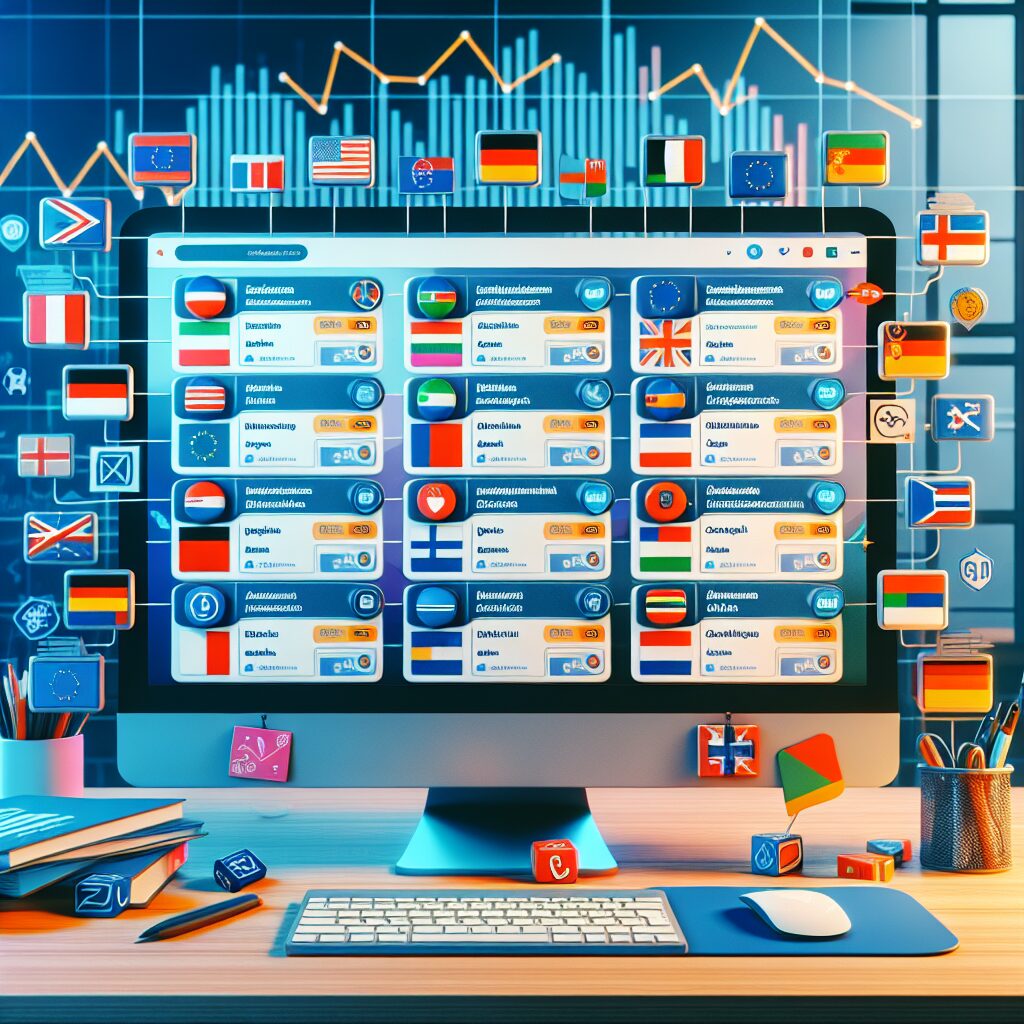About eldris
At Eldris, we automate SEO, multilingual site expansion, and EU compliance for brands scaling across Europe. Our AI-powered platform handles everything from content publishing to regulatory docs—so you don’t have to.
In This Article
- AI tools for SEO streamline multilingual translation, localisation, and optimisation.
- DeepL, Lokalise, and Ubersuggest are top-rated platforms for language-specific SEO duties.
- Automated keyword analysis helps capture search intent across diverse markets.
- AI analytics provide real-time, region-specific performance insights for global campaigns.
- Free and freemium tools offer accessible SEO power to SMEs and emerging brands.
- Tool choices should align with business size, campaign goals, and regional complexity.
- AI dramatically improves ROI by reducing manual effort and accelerating results.
- The future lies in ultra-localisation, generative SEO, and personalise AI ecosystems.
Why AI Tools Matter for Multilingual SEO
The Rise of International Search
AI tools for SEO have revolutionised the way digital marketers tackle global campaigns. As the internet continues to connect users across borders, search engines are processing queries in dozens of languages every second. Businesses targeting diverse regions must ensure their websites are discoverable, relevant, and culturally adapted everywhere. Unfortunately, traditional manual approaches to multilingual SEO are both time-consuming and error-prone. This is where artificial intelligence enters the scene as a game-changer.
Through the integration of machine learning algorithms, natural language processing (NLP), and automated content generation, AI tools for SEO make international search optimisation scalable and accurate. Search engines have become increasingly adept at recognising localisation quality, semantic relevance, and contextual accuracy in foreign-language content. Ignoring this trend places companies at a disadvantage in competitive markets.
Moreover, multilingual users have unique expectations and search behaviours. AI tools help decode these nuances by analysing regional keyword trends, colloquial language constructs, and user intent models. Armed with this intelligence, marketers design campaigns that resonate authentically with local audiences, enhancing engagement and visibility.

Top AI Translation Tools to Watch
Breaking Language Barriers
One of the earliest and most prominent applications of AI tools for SEO lies in translation technology. While tools like Google Translate laid the groundwork, modern AI-driven translators demonstrate exponentially higher accuracy and fluency. Platforms such as DeepL, Amazon Translate, and Microsoft Translator now lead the pack, offering near-human quality translations fine-tuned for business-specific terminology and localisation requirements.
DeepL, in particular, stands out with its ability to interpret context and tone. Unlike older systems that focus on word-for-word translations, DeepL employs neural networks to grasp the broader meaning of a phrase. This capability is essential for SEO-focused content, where semantic relevance affects ranking. Furthermore, these tools can be integrated into CMS platforms to automate the translation of product descriptions, blogs, and metadata across multiple languages.
Beyond mere linguistic conversion, high-tier AI translators also handle idiomatic expressions, regional dialects, and industry jargon. This level of nuance helps prevent embarrassing localisation mishaps while enhancing credibility among international customers. Considering the impact of bounce rates on SEO rankings, timely and culturally accurate translations are paramount.
“AI-powered translation engines are bridging cultures and accelerating multinational digital growth unlike ever before.”
AI-Powered Content Localization Strategies
Translating text is just one piece of the multilingual SEO puzzle. True localisation involves adapting content to align with cultural norms, search intent, and linguistic expectations. AI tools play a critical role here as well. platforms like Transifex, Smartling, and Lokalise combine translation memory with intelligent automation, ensuring each region receives tailored yet consistent messaging.
For example, a marketing message that performs well in the UK may fall flat in Japan without cultural adaptation. AI tools analyse user sentiment, purchasing behaviours, and locally trending phrases to inform content variants. These insights allow marketers to localise headings, imagery, call-to-actions, and layout elements for optimal engagement.
Furthermore, search engine requirements vary internationally. Baidu, Yandex, and Google each have different preferences regarding keyword density, metadata formatting, and backlink profiles. AI localisation tools adjust SEO strategies based on these variances, automatically suggesting and applying technical adaptations.
Ultimately, combining AI localisation with human oversight ensures authenticity without sacrificing efficiency. The result? Campaigns that convert more users and perform stronger in regional SERPs.
Automating Keyword Research in Multiple Languages
Keyword research is foundational to any SEO campaign, whether monolingual or multilingual. However, identifying high-performing keywords in unfamiliar languages presents a daunting challenge. Here too, AI-driven platforms like Semrush, Ahrefs, and Google’s Multilingual BERT models offer an effective solution.
These tools go beyond matching terms to their direct translations. They examine search volume, competition, clickthrough rates, and linguistic context across regions. For instance, a term like “best mobile plan” in English may have multiple colloquial equivalents in French or Arabic, each with its own audience behaviour metrics.
With AI tools for SEO, marketers can quickly generate keyword lists for dozens of languages and filter by intent: transactional, informational, or navigational. Predictive analytics modules then forecast keyword trends, allowing content teams to capitalise on emerging topics ahead of competitors.
Additionally, these tools suggest topic clusters and content hubs, guiding architecture decisions for multilingual websites. Localised keyword mapping ensures that every page aligns with region-specific terms, improving discoverability and site structure coherence.
Performance Tracking with AI Analytics Tools
Effective multilingual SEO doesn’t end at publication. Measuring performance across markets is essential to refine strategies continuously. AI analytics solutions, such as IBM Watson Analytics and Google’s AI-enhanced Search Console, provide real-time data on user engagement, organic traffic sources, and conversion funnels.
What differentiates AI-powered analytics is their ability to surface insights automatically. Instead of sifting through massive spreadsheets, users receive actionable reports highlighting anomalies, growth opportunities, and KPIs at risk.
Machine learning algorithms dynamically adjust attribution models based on new data, allowing businesses to understand campaign impact per region more accurately. In some cases, AI even recommends content updates, backlink strategies, or technical fixes to maintain rankings across different locales.
For multilingual SEO, precise understanding of what performs well in each language supports more adaptive and relevant content strategies. This accelerates ROI and maximises visibility in targeted markets.
Free And Freemium AI SEO Tools in 2025
Not every company can afford enterprise-grade SEO software. Fortunately, 2025 brings a host of cost-effective AI tools for SEO available under free or freemium models. Tools like Ubersuggest’s Language Insights module, NeuralText, and Surfer’s basic plans make multilingual SEO more accessible to SMEs and startups.
These platforms offer features such as automatic keyword translation, SERP simulations, and geo-targeted content scoring. While functionality may be limited compared to premium counterparts, free tools still deliver valuable insights for campaigns with tighter budgets.
Freemium tiers also allow businesses to trial AI technologies before committing to full-scale investments. This phased adoption reduces risk while offering practical exposure to multilingual marketing tactics.
Combining several free tools strategically can cover content creation, keyword localisation, link building, and performance analytics—at near-zero cost. Such flexibility is invaluable to growth-stage enterprises aiming for global reach.
Choosing the Right Tool Based on Business Size
When selecting AI tools for SEO, the optimal choice depends heavily on a company’s size, goals, and in-house expertise. Large corporations benefit from integrated platforms like Adobe Experience Manager and Sitecore, which combine localisation, CMS, and analytics in a single ecosystem.
Mid-sized firms often prefer modular solutions—pairing DeepL for translation with Ahrefs for multilingual keyword research and an analytics dashboard for performance monitoring. This approach ensures control over specific campaign aspects while keeping expenditure manageable.
Smaller businesses and agencies should focus on usability and automation. Tools with intuitive interfaces and robust documentation reduce the learning curve and accelerate deployment. Many platforms now include AI-moderated onboarding to guide users through multilingual setups step-by-step.
Ultimately, scalability, compatibility, and local language support should drive decision-making. Beyond features, consider integration possibilities with your current tech stack to ensure smooth workflows.
AI SEO Tool Comparisons & Reviews
With so many platforms available, comparing AI tools for SEO is imperative before investing. Key criteria include language support, AI capabilities, user reviews, pricing tiers, and integration support. Trusted review aggregators such as G2, TrustRadius, and In-depth review of the best AI SEO tools by HubSpot provide honest assessments compiled from verified users.
Additionally, consider leveraging expert insights from case studies and industry blogs that document the practical use of these tools. For example, Learn more about Multilingual SEO Automation dives deep into campaign outcomes achieved using Surfer and DeepL in tandem.
When comparing tools, look for evidence of adaptive learning, industry-specific NLP, and regular algorithm updates. User forums also provide valuable feedback on real-world challenges, including latency issues and localisation quirks. Round out your evaluation with hands-on trials to see how a tool performs in your specific market context.
International Campaign ROI with AI
Investing in multilingual SEO yields powerful dividends—and AI maximises this promise. Whether your goal is traffic, conversions, or brand recognition, AI-enhanced strategies ensure higher returns through optimisation, agility, and resource savings.
AI tools reduce time-to-market by automating translation, keyword localisation, and content distribution. This efficiency directly correlates with cost savings. Furthermore, campaign precision grows sharper over time as machine learning refines recommendations based on user interactions and regional KPIs.
According to recent studies, multilingual campaigns using AI tools for SEO experience up to 45% stronger ROI compared to manual campaigns. Brands also report faster site internationalisation and reduced dependency on external localisation vendors.
Whether operating in two countries or twenty, deploying AI streamlines operations and enhances campaign resilience against market fluctuations—a major competitive advantage.
The Future of Global SEO With AI
The roadmap for AI tools in SEO is both exciting and continually evolving. Expect further advancements in generative AI for multilingual content creation, deeper voice search optimisation, and real-time translation for user interfaces. OpenAI’s GPT technologies, for example, are already pushing conversational SEO boundaries with multilingual chatbots that drive engagement and inform content strategies.
As regulations on language data and ethical AI tighten, tools will also become more transparent and user-controlled. Custom models trained on brand voice and intent are emerging, allowing total consistency in localised messaging.
Additionally, AI will soon help personalise entire site structures based on locale, enabling dynamic rendering of UI components, menu hierarchies, and media content. This ultra-localisation is projected to significantly boost conversions and user satisfaction worldwide.
Final Thoughts on AI Tools for Multilingual SEO
Read a related article reinforces the urgency for businesses to embrace AI tools for SEO today—not tomorrow. As the global marketplace grows more competitive, brands that leverage AI will sustain visibility and trust across borders. From translation to analytics and beyond, artificial intelligence reshapes every facet of the SEO journey.
By adopting these tools early, marketers not only gain efficiency but also ensure linguistic accuracy, cultural alignment, and sustained relevance in every market they serve. The road ahead promises even greater innovation. Those who adapt now will lead the future of digital growth.
Great guide on top-ai-tools-for-revolutionizing-multilingual-seo-campaigns – Community Feedback
Which AI tool is best for SEO?
The best AI tool for SEO depends on your goals, but popular options in 2025 offer multilingual capabilities, robust automation, and integration with international marketing platforms.
How can AI improve multilingual SEO campaigns?
AI automates content translation, keyword optimization, and localization, enabling brands to reach diverse global audiences efficiently and with greater accuracy.
Are there free AI tools for SEO optimization?
Yes, several free and freemium AI-powered SEO tools are available, offering features like keyword research, performance tracking, and automated translations.








